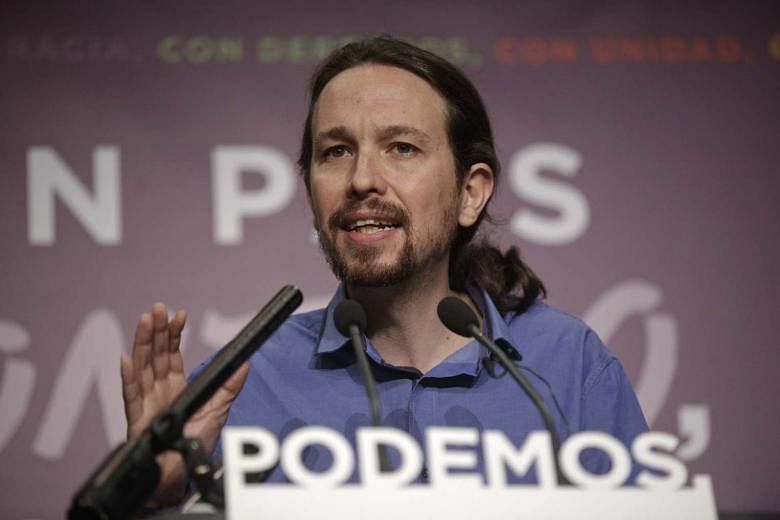MADRID (Reuters) - The first time Pablo Iglesias appeared on his talk show Fort Apache, he sat on a motor bike sporting a ponytail and a leather jacket, and raged against the politicians that had overseen Spain's worst economic crisis in half a century.
Three years on the still ponytailed Iglesias has been cast as potential kingmaker for the next government, after his leftist anti-austerity Podemos finished third in a parliamentary election that ended the two-party system in place since the country returned to democracy in the 1970s.
Podemos ("We Can") had two goals for its first national election: removing the ruling conservative People's Party (PP) and overtaking the Socialist Party (PSOE) as Spain's biggest left-wing force.
It fell short of the second objective but could achieve the first if it agrees a pact with the Socialists and other leftists.
So far, Iglesias has said in a press briefing his upstart party that came third in Sunday's elections would not support any form of PP government, while Cesar Luena of the Socialist party (PSOE) said it would not back a Rajoy-led regime.
Iglesias has set clear terms for such an alliance, which has precedents at regional level.
But to transfer it to the national stage, Podemos will also have to cross red lines of its own.
The first will be accepting becoming part of the political establishment the party has been fighting since it was formed two years ago - a transition his track record suggests Iglesias is capable of making.
A fan of the TV series Games of Thrones, he has often described politics as "the art of accumulating power".
Iglesias has also been a steadfast and outspoken supporter of Alexis Tsipras, endorsing him at a rally in Athens in September on the eve of a re-election that completed the Greek prime minister's journey from far-left firebrand to centre-left pragmatist.
"Initially (Podemos) thought that to get a foot in the door they had to be very intense to distinguish themselves, but over time they have become more moderate to gain broader support,"said Ivan Llamazares, a political science professor at the University of Salamanca.
REFORMIST NOT RADICAL
Podemos' election success comes after it toned down its most radical proposals in recent few months, which helped counter the emergence of a rival newcomer party, the centrist Ciudadanos, that finished well back in fourth place.
Earlier pledges of a universal minimum level of income, a restructuring of Spain's near 1 trillion-euro debt, and nationalising the energy and health sectors have either been softened or dropped, Llamazares said.
He would expect a government involving Podemos to be reformist but not radical, with a focus on public education, healthcare and a more progressive tax system.
Iglesias said all four of the party's conditions for joining a leftist coalition - more social policies, a new electoral law, mechanisms to better control government and the recognition that Spain is a plurinational state - should be included in a new constitution. "It's too early to talk about pacts," said Iglesias, a former professor of political science at Madrid's Complutense University, after the result was announced. "But it's not too early to discuss those constitutional and political changes... We are the only political force at the state level capable of enacting an agreement that respects the multinational identity of our country," he said, hinting at the party's potential role as power broker.
To improve its election odds, the party recruited independent candidates including the mayors of Barcelona and Madrid, judges and the former chief of staff of Spain's army.
In a further parallel with events in Greece - where Tsipras's Syriza party spilt over whether to back the country's third bailout - Podemos also purged some of its more radical members.
They included co-founder Juan Carlos Monedero, who criticized what he called Iglesias' efforts to curtail the power of Podemos' grass roots.
"LITTLE BY LITTLE WE HAVE MATURED"
Irene Montero, a 27-year-old Podemos delegate who Iglesias has named as one of two vice-presidents in a possible cabinet, counters that the party has simply grown up. "We saw ourselves as a force that wanted to give a voice to those who had none," she told Reuters in a telephone interview."And little by little we have matured, which does not mean that we have lost sight of our principles." Iglesias has admitted Podemos would have to be flexible to gain power. "If you want to win, don't do what the left would do," he wrote in a book last year, in which he criticized other leftist parties for their reluctance to use the media to broadcast and their refusal to budge on certain issues.
The shift has caused some of Podemos' most ardent supporters to question their allegiance, but many remain on board.
At Podemos' last election rally in Valencia last week, 60-year-old volunteer Jesus Falco said its success marked a turning point after decades of division in Spain's far-left. "The left was imprisoned by itself," he said. "Pablo Iglesias was smart enough not to stay outside of the system."

